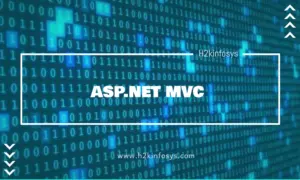MVC and .NET Core 3.0 – The two turning points
What we can confidently say about .NET is that it is aging well. Who would have thought that .NET would survive this long in competition, especially being partially proprietary software? The future of .NET seems bright say the experts. So, what is it with Dot NET that is keeping flame burning. Let’s delve deeper and find out. At H2K Infosys, we offer Dot NET online training for enthusiasts across the world who like to make a career in far from dying .NET platform.
The two breaks – DotNET Core 3.0 and MVC
The DotNET Core 3.0 release in 2019 and the introduction of MVC (Model View Controller) architecture earlier, have both proved to be a turning point for .NET. The interesting part is Microsoft has made both open-source which led to the growing community of .NET users.
.NET 3.0
The .NET Core 3.0 is touted to be a stable and business version of .NET Core. So, the companies can rely on .NET Core to build applications more confidently. More so, because .NET Core prior to 3.0 version was unable to support Windows Forms and Windows Presentation Foundation (WPF).
Just a reminder. The issue with .NET Framework which restricted the development of desktop applications to Windows alone has been resolved with .NET Core. The .NET Core supports cross-platform application development.
However, we can safely say the following of .NET Core 3.0:
- DotNET Core now supports most of the features of .NET Frameworks, which basically means it is a true extension of the latter.
- .NET Core supports both WinForms and WPF.
- Now, has Windows compatibility pack
The best part is yet to come. .NET 5 is slated for a release in the latter part of 2020. This upcoming release is said to bundle both .NET Framework and .NET Core 3.1 into .NET 5.0.
What is MVC?
Model View Controller (MVC) is not a language or a framework but an architecture. It has three components – Model, View, and Controller.
Model – Model comprises all the data which will be retrieved on request by the user.
View – Has the UI code.
Controller – Business Logic Code.
Properties of MVC:
- Loose Coupling
- Easy coding
- New, impressive look
- Makes testing simpler
- Quick application integrated development
What is the future of .NET?
The MVC architecture has proved to be a breakthrough indeed for .NET users. More companies have started adopting .NET. Naturally, the demand for .NET developers is on the rise. Therefore, anyone aspiring to opt for .NET programming can go for it without any hesitation.
For the best Dot Net Course in the USA, contact www.h2kinfosys.com.






























3 Responses
Thanks for sharing the information about .NET it’s very informative. very good article, keep sharing.
Nice article. Your collection is very helpful. Thanks for sharing